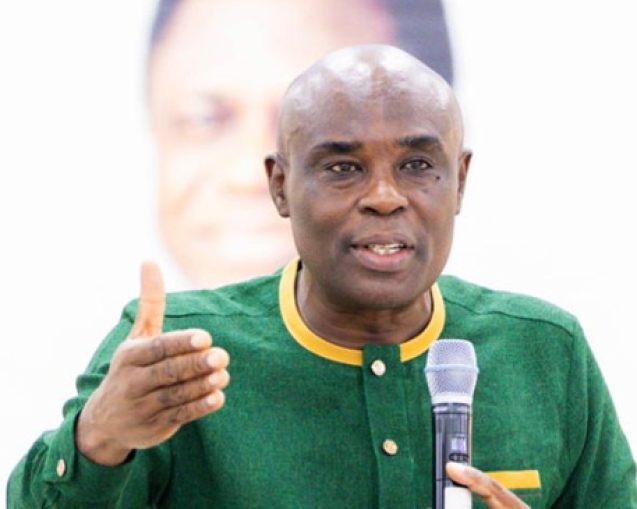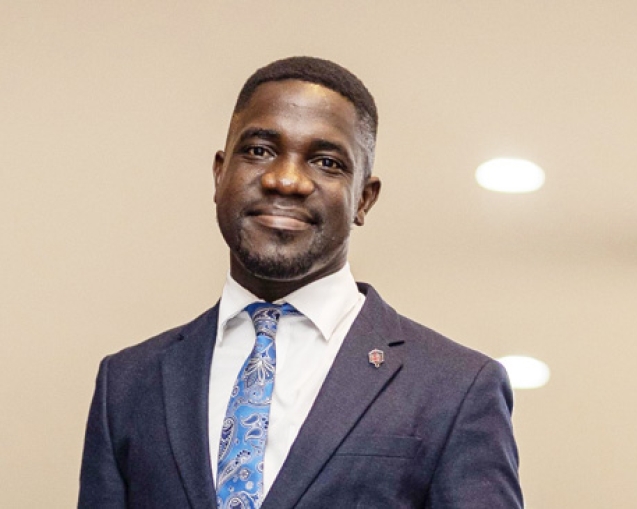On this special occasion of Officers appreciation Day, I can only join the millions and well-meaning populace of The Church of Pentecost to pay a glowing tribute to its Officers. The commitments, energy levels, sacrifices and Love for God and the church by the Officers at times beats my imagination. God’s work is a calling indeed, and they are a testament to this true saying. Otherwise, how could one explain the zeal with which some toil tirelessly to ensure the church gets a place or parcel of Land for worship when they themselves have none to boast of. How could you imagine some fasting and praying for God’s intervention in the lives of the members amidst their own unresolved challenges. Again, why they do not get exhausted in following-up and visiting the members even when the latter do not reciprocate such gestures equally baffles my mind. It can only be their Love for God, His children and unflinching loyalty to the leadership of The Church.
To mention a few, I cannot forget Teacher Oppong, my Sunday school teacher during the late 70s and early 80s in Dormaa Ahenkro who helped me to recite my first ever Bible text. Late Elder Ntow, during the same period also taught me the lyrics of my first Pentecostal hymn. May His soul rest in peace. Elders Raymond Poku and Kodua (a.k.a Prof Ko) during their days at Prempeh College who helped me during my A’ Levels days. I say a big thank you to you all because your sacrifices went beyond the confines of the church. Deaconess Mrs Alberta Lomotey, your constant words of encouragement, prayers, and support ever since we entered the full time Ministry has been amazing. And to all Officers at the headquarters, Areas and Districts I have served such as Agona Swedru, Bolgatanga and Kaneshie, I doff my hat in awe for you all. Your labor in the Lord is never in vain.
People are appointed to find solutions to problems and offer directions as and when needed. God found a specific task and project for Moses to execute in Egypt before giving him the title, Prophet. Stephen was also a young man in a group the early church leadership chose to serve as Deacons during the first century AD. “In those days when the number of disciples was increasing, the Hellenistic Jews among them complained against the Hebraic Jews because their widows were being overlooked in the daily distribution of food.” (Acts 6:1). They were, thus, selected to solve problems and not as a reward for their regular fellowship in church. Stephen’s terms of reference as a Deacon were to de-escalate the rising tension between the Hebraic Jews and their Hellenistic counterpart. Together with his colleagues, they were also to ensure a fair and incident-free mode of distributing food and other resources amongst the members. Per a typical Church liturgy, the role given to Stephen was one of the most unspiritual but stressful and loaded with the likelihood of confrontations. It was, therefore, not surprising that the Apostles wanted a tried and tested Spirit-filled people to handle such a task.
Stephen and the other six deacons were shortlisted and endorsed by their congregants or Local assembly. They, therefore, enjoyed the goodwill and support of the church due to their virtues. Making a list of seven out of the lot was not a small feat Stephen and his friends chalked. It was, therefore, not difficult for the early Church leadership to lay hands upon them and commission them to continue with their service. These were young men with great aspirations to grow and possibly become Apostles and take up the ruins of power after the first-generation leadership. They were, however, assigned to serve tables. Why would the leaders of the early church require people with faith who are Spirit-filled to oversee the distribution of “common” food among women? Was there anything Apostle Peter saw ahead that the church had not seen? More so, these were young men in their late 20s and early 30s going to work amongst women daily.
Ironically, there would also be some greedy foodians or gluttons who would envy that portfolio of Stephen due to the opportunity of enriching themselves with dishonest gains. For them, all Stephen needed to do was to strike the necessary acquaintances with the domestic bursars and cooks to have access to the best portions of the meat. These characters would, therefore, not pray for one’s survival in such a highly “inflammable” seat but design and mount impediments and unwarranted attacks to cause their failure. Deacon Stephen would have done himself a great disservice should he have taken a posturing of whirling away time eagerly waiting for a higher appointment. It would have distracted and affected his performance as the food distribution officer and suffered a replacement.
Meanwhile, many others who saw his office as a juicy one would also be eagerly waiting to take up that role. Therefore, let all assigned any role in the Lord’s vineyard business stay focused and offer their best. What others call “Table Serving” may require even more spirituality than some of the roles that appear spiritual. Of course, all things being equal, Stephen’s schedule wouldn’t allow him much space to pray and be with the Word as the Apostles. After all, the church leadership wanted to focus on the word and prayer.
Yet his submission and presentation in Acts 7 about God and his creation up to his day did not look like someone running the Food distribution schedule and only mediating between feuding factions. In a typical high school setting, Stephen spoke like the founder of a scripture union and not the dining hall prefect. Even before his much-touted speech in Acts 7, God worked miracles, signs, and wonders with him. “Now Stephen, a man full of God’s grace and power, performed great wonders and signs among the people.” (Acts 6:8). One would have thought that all Peter needed was a courageous man with some sense of discipline to handle the contention between the Jewish and Greek women. But wait a minute, what was about to follow Stephen’s task was more than one could imagine.
After Stephen’s excellent management of the confusion between the Jewish and Greek women, another problematic issue arose. This time around, it was between men and not women. “Opposition arose, however, from members of the Synagogue of the Freedmen (as it was called)—Jews of Cyrene and Alexandria as well as the provinces of Cilicia and Asia —who began to argue with Stephen. But they could not stand up against the wisdom the Spirit gave him as he spoke.” (Acts 6:9-10). Stephen, therefore, did not only perform great wonders and signs, but God also endowed him with great wisdom. Can those who are supposed to focus on serving tables perform miracles? And do they also need great wisdom for their daily operations? Yes, of course! If such was the challenge a “common” table servant went through, what do you think awaited the Apostles by way of challenges?
What presents as a social or socio-economic challenge in the things of God usually takes more to resolve than the use of physical and human resources. Warning the church about Satanic infiltrations, Apostle Paul said in 2 Corinthians 2:11, “For we are not unaware of his schemes.” It is expected of everyone who takes any appointment in the church to show the highest level of spiritual consciousness with the help of the Holy Spirit. Which lapses have you identified and are prayerfully seeking an opportunity to resolve in your household, organization, or church? Or you want the appointment or title before trying to help in the Lord’s vineyard business?
At the time of Stephen’s appointment, there were other ranks such as Elders, Overseers, Pastors, Apostles, Evangelists, Prophets, and Teachers. Stephen, however, focused on raising the bar and standards as a Deacon of the early church instead of harboring ambitions for any of such higher positions. It is common for people to lose their passion and joy for want of higher ecclesiastical ranks other than what they hold. Such folks keep deluding themselves, thinking they would fare better with those higher portfolios deserving of them. Today, some have also spent many years in their churches but can hardly be found when any roll of workers is being called. They argue they wouldn’t want to entangle themselves with too many church activities to the detriment of their family lives and professional careers. Little do they know that God’s yoke by service is far lighter than the load this world would pile on them. Jesus told His disciples in Matthew 11:30, “For my yoke is easy, and my burden is light.”
Much wasn’t mentioned in the Bible about Stephen’s academic qualifications. Still, his attempt to summarize the good Book into one single chapter qualifies to be the greatest of all time English Literature summaries. He compressed more than a thousand chapters into one. That is what The Holy Spirit can achieve for all who allow Him free space to operate. Stephen’s devotional life, coupled with his confidence and courage before the connoisseurs of everything religion at the time, was admirable. Although they fumed at him, it never stopped him from delivery the words of wisdom the Holy Spirit gave him for them. Indeed, when Deacon Stephen displayed that enviable levels of growth and maturity in the Lord, he could only have been three and a half years old in the Lord. (i.e., If we even assume he was also in the Upper Room when the Holy Spirit descended upon the early Church). Stephen’s age in the Lord and his display of maturity only challenge and leave us higher in rank and ecclesiastical titles in a deep state of reflection.
Those who were introduced to the Lord at a very early age and have spent quite some time in the things of God but are still requesting some additional time to stop, say, lying must watch out. Unfortunately, others are also literally pleading for some ample time to overcome sins such as sexual immorality, dishonesty, and unfaithfulness to God when it comes to tithing. We must all understand that the end is much closer than ever. After his presentation, Stephen was painfully dragged out of the synagogue and stoned to death by Saul and the Sanhedrin. (Acts 7:56-58)
“While they were stoning him, Stephen prayed, “Lord Jesus, receive my spirit.” Then he fell on his knees and cried out, “Lord, do not hold this sin against them.” When he had said this, he fell asleep.” (Acts 7:59). According to Acts chapter seven, Stephen was a man of prayer and the word, full of the Holy Spirit and exhibited a great deal of faith in God. He was a respectful deacon but chose to say it as it was, and he wasn’t bothered by the number of influential people who bore and gnashed their teeth at him. No wonder he rose to the occasion, forgave, and prayed for a character like Saul, who was one of the Architects responsible for his murder. Stephen’s prayer, before breathing his last, I believed was consequential to Saul’s encounter with Christ on his way to Damascus. Such a powerful display of Christian virtues by Stephen, reminiscent of what Christ also did on the cross before giving up the ghost, is only achievable by the Spirit-filled person.
How many of us aren’t still holding onto offense even after countless interventions by God’s servants? Only God knows the number of possible “Apostle Pauls” who have been denied their transformation due to unforgiveness by their victims. Others have also taken into their graves the forgiveness and release of those who offended them. Deacon Stephen, the Spirit-filled man of faith, was, however, not going to have any of that. Seeing God’s glory and Jesus standing at the Father’s right hand, he saw no reason to hold on to what Saul and his company did against him. The heartwarming sight of God’s glory doesn’t just allow the offended to continue to harbor an offense.
I have heard arguments suggesting that Stephen would have lived a little longer as a Deacon and rise to occupy higher positions if he had been a little diplomatic before the Sanhedrin. They argue that he should have been wiser in his presentation and avoided truths about Christ that appeared offensive to the Council. This argument lacks merit since the narrative and subsequent heavenly protocols Christ Himself accorded Stephen doesn’t support such assertions. Stephen’s concluding remarks that got the Sanhedrin furious was,” Look, I see heaven open and the Son of Man standing at the right hand of God.” (Acts 7:56). Was it the mention of heaven, Son of Man or God in that sentence that infuriated them? What else could he have said, and how could he have put that sentence? It is worth noting that no garnishing of the truth about Christ would appease a heart and mind under the rulership of the prince of this world.
In any case, a much longer life in which world are they talking about? Did Stephen, in any way, by his submission, make any statement that suggested he had not finished his work on earth, and so needed some more days? What else did he need after saying a prayer that culminated in the conversion and transformation of Saul to become Apostle Paul? Deacon Stephen received a standing ovation from Jesus Christ, who the Bible confirms as sitting at the Father’s right hand because he wholeheartedly accepted his calling as a deacon and didn’t get distracted by the prospect of a higher rank. He understood as a young man in the Lord that it doesn’t take ecclesiastical titles to be a tremendous apologetic of the Christian faith. He showed that one doesn’t need to be a writer before influencing the conversion of phenomenal authors like Apostle Paul.
As I conclude, I would like to pay a glowing tribute once again to all the laity in The Church of Pentecost as we celebrate this year’s Officers Appreciation Day. Congratulations to you all, gallant soldiers in the Lord’s end-time army. Your contribution from the days of Deacon Stephen has been fantastic and immeasurable by all standards. Amid our modern-day challenges, continue your hard work because your labor in the Lord will never be in vain. God bless you and Long Live Officers of The Church of Pentecost.
Written by Apostle James Orhin Agyin


















